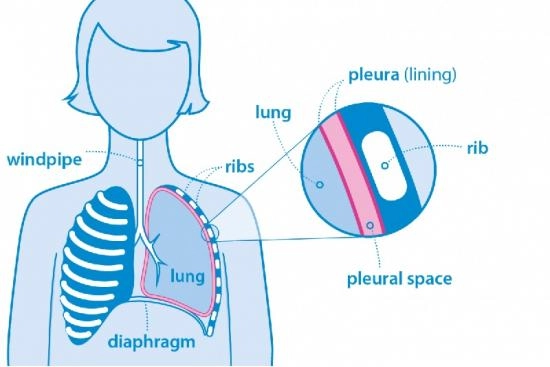Pleural mesothelioma is a rare and aggressive form of cancer that affects the lining of the lungs. This type of cancer is almost always associated with exposure to asbestos, a mineral that was once widely used in construction and other industries. Early detection and appropriate treatment are essential to improve life expectancy.
Pleural mesothelioma in Turkey is professionally treated in our best partner clinics at competitive prices!
We're Here to Help.

Malignant pleural mesothelioma: An overview
Mesothelioma is a rare form of malignant tumor that affects the cells of the mesothelium. The mesothelium is the protective membrane that surrounds most of the body's internal organs, such as the pleura, peritoneum, and pericardium.
The most common form of this disease is malignant pleural mesothelioma. This is a primary form of pleural cancer, characterized by the proliferation of cancer cells in the tissue that makes up the pleura.
The pleura surrounding the lungs is made up of two layers: the outer layer, also known as the parietal pleura, lines the inside of the chest cavity, while the inner layer, also known as the visceral pleura, covers the lungs.
As the disease progresses, the pleura thickens and takes on a scalloped appearance, and the space between these two layers (the pleural cavity) can fill with fluid, causing difficulty breathing.
Symptoms and Diagnosis
Symptoms of pleural mesothelioma may include
- Shortness of breath
- Persistent cough
- Chest pain
- Fatigue and unexplained weight loss
If these symptoms persist, prompt medical attention is essential. A thorough evaluation by a physician, including imaging studies, biopsies, and blood tests, is essential to confirm the diagnosis.
These diagnostic steps allow the doctor in Turkey to assess the extent of the disease and determine the most appropriate treatment plan.
Increasing awareness of these signs and promoting early treatment are essential to improving clinical outcomes in the treatment of pleural mesothelioma.
Treatment Options for Pleural Mesothelioma in Turkey
When it comes to treating pleural mesothelioma, a multidisciplinary approach including surgery, chemotherapy, and radiation therapy is often recommended. In Turkey, the specific treatment plan will depend on several factors. We take into account the stage of cancer, the patient's overall health, and individual preferences.
Surgery: Removal of cancerous tissue
Surgery is crucial in the management of pleural mesothelioma, aiming to remove as much cancerous tissue as possible. Surgical options vary depending on the stage of the disease and may include the following:
- Pleurectomy/Decortication (P/D): This procedure removes the pleura affected by the cancer while sparing the underlying lung. P/D may help relieve symptoms and improve quality of life.
- Extrapleural pneumonectomy (EPP): In cases where the cancer has spread widely, EPP may be performed. This involves removing the affected lung, pleura, and surrounding tissue. EPP is a more extensive procedure and is generally reserved for selected patients.
Chemotherapy: Targeting Cancer Cells
Chemotherapy is a common treatment for pleural mesothelioma. It can be given intravenously or directly into the chest cavity. The goal of chemotherapy is to kill cancer cells, reduce the size of the tumor, and control the spread of the disease. Although side effects are possible, advances in chemotherapy drugs have improved both their effectiveness and their tolerability.
Radiation therapy: localized treatment
Radiation therapy uses high-energy beams to target and kill cancer cells. It is often used in conjunction with surgery or chemotherapy to increase the effectiveness of the treatment. In the case of pleural mesothelioma, radiotherapy is usually delivered externally and targeted to the specific areas affected by the disease. Despite potential side effects, radiation therapy can provide significant relief by reducing pain and slowing tumor growth.
Life Expectancy and Prognosis
Pleural mesothelioma has a generally poor prognosis, with a median survival rate of about 12–21 months. However, advancements in treatment options and early detection have shown promise in improving life expectancy and quality of life for patients. Factors such as the stage of the disease, overall health, and response to treatment can influence a patient's prognosis.
Early detection and intervention play a vital role in improving the outlook for pleural mesothelioma patients. Therefore, it is crucial to prioritize regular medical check-ups, particularly for individuals who have a history of asbestos exposure.
Share this page









